Doubling of first offence penalty looking increasingly likely
 The World Anti Doping Agency has warned that the second year of a freeze on its budget could potentially lead to cuts in the amount of testing that it is able to do, with governments saying that they wouldn’t increase funding for 2013.
The World Anti Doping Agency has warned that the second year of a freeze on its budget could potentially lead to cuts in the amount of testing that it is able to do, with governments saying that they wouldn’t increase funding for 2013.
Half of WADA’s budget is provided by governments and the decision means that the Agency will have to operate on the same funding as 2011.
“This is the second year in a row that we have received a zero-percent increase, and while we appreciate that economies across the world continue to struggle, this freeze is not ideal for the fight against doping in sport,” explained its president John Fahey.
“It is widely accepted that doping is a major issue no longer restricted to the sporting world, and that it must be addressed by society as a whole.
“WADA has dipped into reserves over the last two years to cover shortfalls for its operating costs, but if funding continues to remain the same then the Agency will be forced to cut back its activities.”
Given inflation, the freeze essentially represents a slight erosion in the budget WADA has to operate.
Despite that, the Agency continues to work at increasing the deterrents for dopers, and has moved a step closer to doubling the standard two year ban for a first serious doping offence.
Its Foundation Board was presented with a second draft of the proposed 2015 WADA Code at a meeting in Montreal this weekend. The changes had been reviewed by WADA’s Executive Committee one day earlier.
The Agency is moving towards bigger deterrents for those who use anabolic steroids, EPO, human growth hormone, masking agents, trafficking and prohibited methods such as blood transfusions. Penalties for such offences are currently two years for a first offence but if the changes go through as planned, this will be doubled to four years.
“It is clear from the number of submissions we received, that there is a strong desire in the world of sport, from governments and within the anti-doping community to strengthen the sanction articles in the Code,” said Fahey.
“This second draft has done that, doubling the length of suspension for serious offenders and widening the scope for anti-doping organizations to impose lifetime bans.
“The Code review is intended to increase the effectiveness of anti-doping, and athletes must know that there is a heavy price to pay for intentional doping, that the risks are high. I am confident this draft will deliver that message loud and clear, and that our own stakeholders will agree.”
Two proposals which haven’t been implemented for the current draft are one which suggested removing the B sample, as well as one which would change the sanction process for teams in the case of positive tests by two members.
The third and final consultation phase of the Code review process will begin December third and run until March 1st of next year.